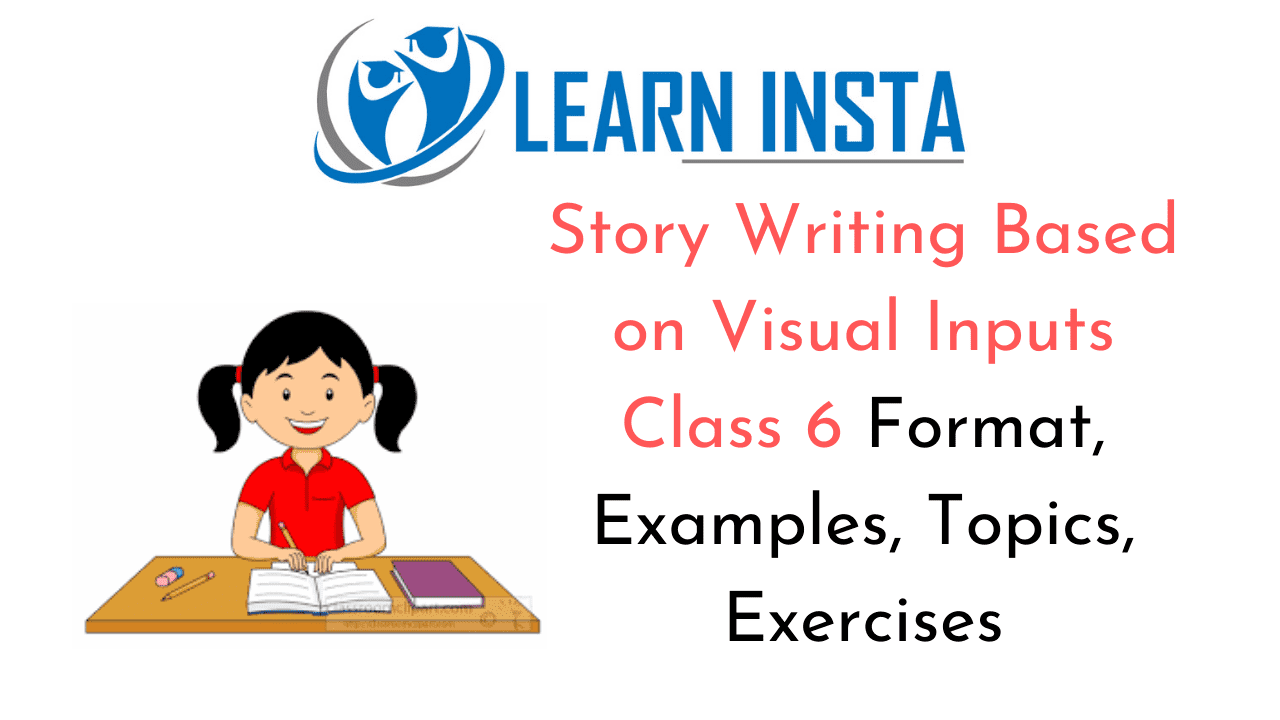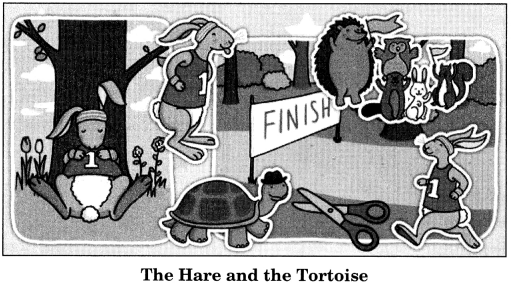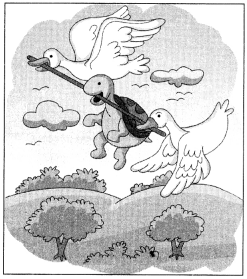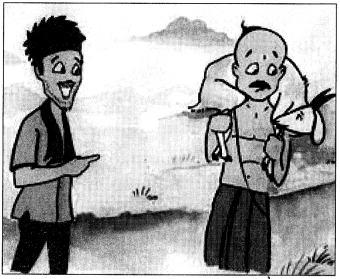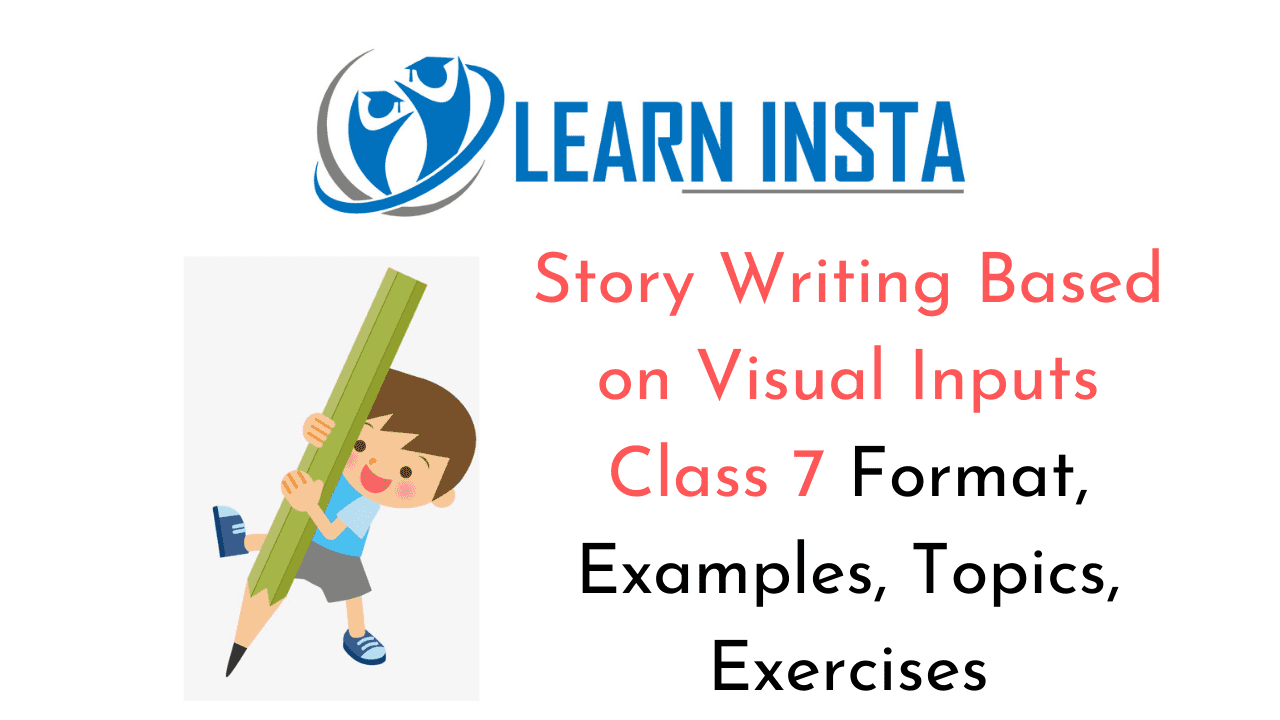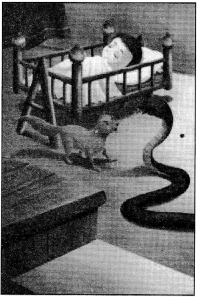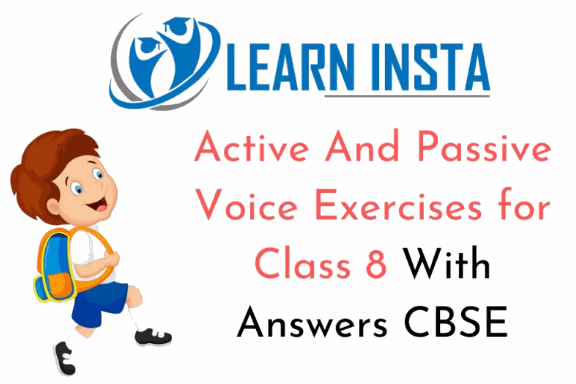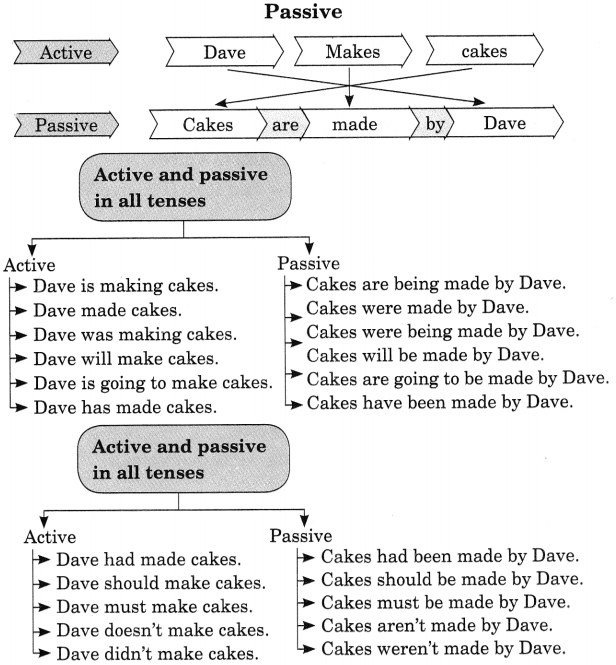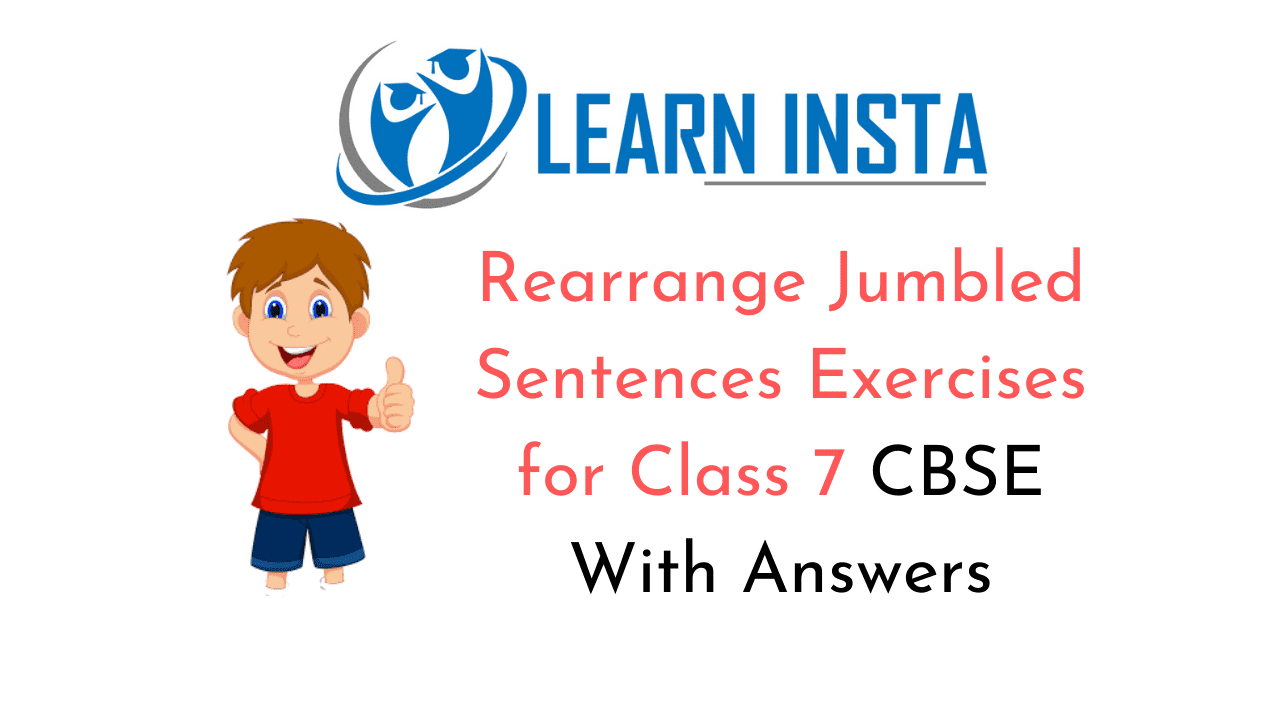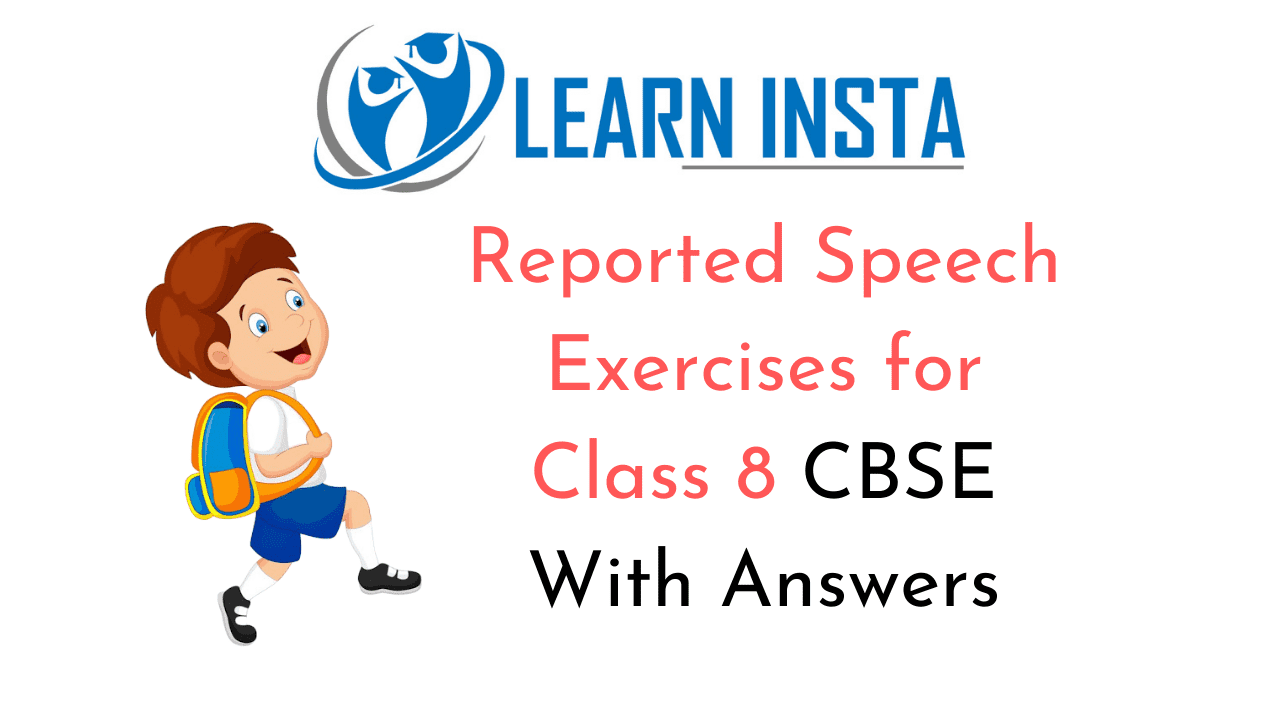
When we want to tell somebody else what another person said, we can use either direct speech and reported speech.
When we use direct speech, we use the same words but use quotation marks, For example: Scott said, “I am coming to work. I will be late because there is a lot of traffic now.”
When we use reported speech, we usually change the verbs, specific times, and pronouns. For example: Scott said that he was coming to work. He said that he would be late because there was a lot of traffic at that time.
Reported Speech Exercises for Class 8 CBSE With Answers Pdf
This grammar section explains English Grammar in a clear and simple way. There are example sentences to show how the language is used. NCERT Solutions for Class 8 English will help you to write better answers in your Class 10 exams. Because the Solutions are solved by subject matter experts.
Fundamentals:
The art of reporting the words of a speaker is called Narration. It is of two types:-
- Direct Speech: We quote the actual words of the speaker in inverted commas: He said to me, “I am playing.”
- Indirect Speech: We quote the words or speech of the speaker in our own words, without inverted commas: He told me that he was playing.
In narration a sentence has two parts:-
- Reporting verb: He said to me,
- Reported speech: “I am playing.”
Rules of Changing Pronouns
- The pronoun of First Person is changed according to the subject of Reported speech.
- The pronoun of Second Person is changed according to Object
- The pronoun of Third Person is not changed at all. (The formula to change pronoun is 123/SON.)
SON: S – subject, O – object, N – no change
Persons: There are three types of persons:-
- First Person (I, we, my, me, our)
- Second Person (You, your)
- Third Person (He, she, it, his, they, them etc.)
Part-I (Assertive Sentences in Present or Future)
Rules
1. If Reporting Verb is in Present or Future Tense the tense of Reported speech is not changed.
2. (” “) inverted commas are replaced with the conjunction ‘that’.
3. Say to is replaced with tell, says to with tells and said to with told.
Examples:-
- The boys say, “We have learnt the lesson”.
The boys say that they have learnt the lesson. - Reena will say, “I am going to America”.
Reena will say that she is going to America. - The servant says to me, “The manager will come in the evening”.
The servant tells me that the manager will come in the evening. - He has said to them, “You were playing cricket yesterday.”
He has told them that they were playing cricket yesterday.
Part-II (Assertive Sentences in Past)
Rules:-
1. ‘said to’ is changed into ‘told’.
2. Use conjunction ‘that’ to connect
3. If Reporting Verb is in Past Tense the tense of the Reported Speech is changed according to the rules given below: –
- Present Indefinite changes to Past Indefinite
- Present Continuous changes to Past Continuous
- Present Perfect changes to Past Perfect
- Present Perfect.Continuous changes to Past Perfect Continuous
- Past Indefinite changes to Past Perfect
- Past Continuous changes to Past Perfect Continuous
- Will/Shall changes to Would/Should
- Can changes to Could
- May changes to Might
In Reported Speech words showing nearness changes into words showing distance:-
- This becomes That
- These becomes Those
- Now becomes Then
- Today becomes That day
- Tonight becomes That night
- Yesterday becomes The previous day
- Last night becomes The previous night
- The next day becomes The following day
- Here becomes There
- Ago becomes Before
Examples:
- He said, “I am going to college today.”
He said that he was going to college that day. - Sunny said to me, “You will get good marks in this test.”
Sunny told me that I would get good marks in that test. - She said to her mother, “My teacher awarded me yesterday.”
She told her mother that her teacher had awarded her the previous day. - Rajani said to her friends, “You were shopping in the market.”
Rajani told her friends that they had been shopping in the market. - I said, “Ritu, you will learn very fast.”
I told Ritu that she would learn very fast. - “I may go to London next month,” he said.
He told that he might go to London the following month.
Note: If Reported Speech has an explanation of Universal Truth, Habitual Fact or Historical Fact its Tense is not changed at all.
Examples:-
- He said, “The earth moves round the sun.”
He.said that the earth moves round the sun. - She said to me, “Mohan plays with left hand.”
She told me that Mohan plays with left hand. - The teacher said to the students, “India became independent in 1947.”
The teacher told the students that India became independent in 1947.
Part-III (Interrogative Sentences)
Rules:
1. In Interrogative sentences said or said to of reporting verb are replaced with asked or enquired.
2. If the interrogative (question) begins with Helping Verb or Modal (is, am, are, do, does, was, were, has, have, had, will, shall, would, can, could, should, may, might, must, etc.) the inverted commas (” “) are replaced with the conjunction if or whether.
3. If the interrogative (question) begins with WH-family (Why, what, which, when, whose, who, whom, how, etc.) the inverted commas (” “) are not replaced with any conjunction at all.
4. If there are no interrogatives (questions) in indirect speech we place helping verb or modal after the subject.
Examples:-
- The teacher said to us, “Have you completed your home work?”
The teacher asked us if we had completed our home work. - He said to me, “Did you finish your work yesterday?”
He asked me if I had finished my work the previous day. - Rocky said, “Meena, do you want to go to Shimla?”
Rocky asked Meena if she wanted to go to Shimla. - I said to him, “Will you return tomorrow?”
I asked him if he would return the next day. - Ravi said to him, “What have you learnt?”
Ravi asked him what he had learnt. - She said, “Which train will go to Jaipur?”
She enquired which train would go to Jaipur.
Interrogative Sentences in present or future:
- She says to them, “Have you taken the money?”
She asks them if they have taken the money. - He will say to me, “What can I do for you?”
He will ask me what he can do for me.
Part-IV (Imperative Sentences)
Rules:
1. In Imperative sentences said to is replaced with ordered, commanded, advised, suggested, proposed, persuaded, warned, etc.
2. Inverted commas (” “) are replaced with ‘to’. The first form of verb is applied after ‘to’.
3. In Negative sentences ‘said’ to is replaced with ‘forbade’ or ‘do’ is replaced with ‘not’.
Examples:-
- She said to me, “Work hard”.
She advised me to work hard. - I said to my friend, “Please give me your car for two hours.”
I requested my friend to give me his car for two hours. - She said to Meena, “Do not make a noise”.
She forbade Meena to make a noise. (or She ordered Meena not to make a noise.) - The general said to the soldiers, “March forward.”
The general commanded the soldiers to march forward. - Ramesh said to him, “Let me do my home work.”
Ramesh requested him to let him do his home work. - The manager said to the peon, “Let the visitors come in.”
The manager ordered the peon to let the visitors come in. - He said to me, “Let us go on picnic this Sunday”.
He proposed/suggested me that we should go on a picnic that Sunday. (or He proposed me to go on a picnic that Sunday. - He said, “Thank you, doctor.”
He thanked the doctor. - Dinkar said to me, “Beware of such politicians.”
Dinkar warned me against such politicians.
PART-V (Exclamatory Sentences)
Rules:
1. Use conjunction ‘that’ to connect the speech with reporting verb.
2. Change tenses according to the rules learnt in PART-II.
3. ‘Said’ is mostly changed into ‘exclaimed’ (sometimes ‘applauded saying’)
4. Replace ‘what’ or ‘how’ with ‘very’ (sometimes ‘big’ or ‘great’).
5. Replace exclamatory words as follows: AH!, Alas!…. with sorrow; Aha!, Ha!, Hurrah! ….with joy; Oh with surprise; Pooh! ….with contempt; Sorry! with regret, Bravo! with applauded saying.
Examples:
- The child said, “What a bitter medicine!”
The child exclaimed that the medicine was very bitter. - He said, “How big the train is!”
He exclaimed that the train was very big. - Vikas said, “Alas! I have lost my wallet.”
Vikas exclaimed with sorrow that he had lost his wallet. - Rajani said to her friend, “Pooh! You have cheated me.”
Rajani exclaimed with contempt that her friend had cheated her. - The captain said to the players, “Bravo! You played well today.”
The captain applauded his players saying that they had played well that day.
PART-VI (Optative Sentences)
Rules:
1. Such sentences indicate greeting & wishes (good morning, good noon, good day, would that, etc.), and prayer (may, may God). Therefore ‘said’ is mostly replaced with ‘wished’ or ‘prayed’.
2. In case of good bye, farewell, good night (when parting company) ‘said’ is replaced with ‘bade’.
Examples:-
- He said, “Good morning uncle!”
He wished his uncle good morning. - Ranjita said, “Good bye friends!”
Ranjita bade her friends good bye. - My grandmother said to me, “May you live long.”
My grandmother prayed me that I might live long. - Montu said, “Would that I were a minister!”
Montu wished that he had been a minister.
Indirect Speech of two or more sentences:
- She said to me, “I am going to the market. Do you want to go?”
She told me that she was going to the market and asked if I wanted to go. - The manager said to the clerk, “You may leave now. Don’t forget to keep these files in the file cabinet.”
The manager told the clerk that he might leave then and ordered not to forget to keep those files in the file cabinet. - The doctor said to the patient, “Why didn’t you come yesterday. You have a high fever.”
The doctor asked the patient why he hadn’t come the previous day as he had a high fever was high. - I said to Rocky, “Don’t abuse others. It is a bad habit. How will you feel if others abuse you?”
I advised Rocky not to abuse others because it is a bad habit and asked how he would feel if others abused him.
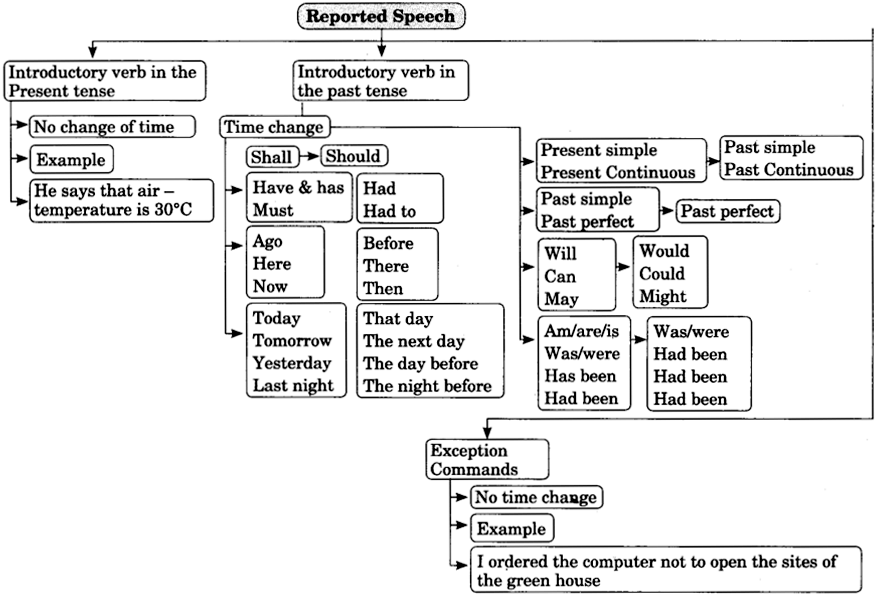
Reported Speech Solved Examples Exercises for Class 8 CBSE
Question 1.
Fill in the blanks
(i) She looks pretty sick. I think she _____________ go to a doctor.
(a) should
(b) can
Answer:
(a) should
(ii) You’ve been driving all day. You _____________ be exhausted!
(a) should
(b) must
Answer:
(b) must
(iii) You _____________ smoke so much. It’s bad for your health.
(a) can’t
(b) shouldn’t
Answer:
(b) shouldn’t
(iv) Hey I’m lost _____________ you help me?
(a) can
(b) should
Answer:
(a) can
(v) You have such a beautiful voice. You _____________ sing for us!
(a) should
(b) can
Answer:
(a) should
(vi) I know he speaks five languages, but _____________ he speak Arabic?
(a) should
(b) can
Answer:
(b) can
(vii) That looks very expensive. It _____________ have cost a fortune!
(a) should
(b) must
Answer:
(b) must
(viii) I _____________ believe that you failed your test!
(a) can’t
(b) shouldn’t
Answer:
(a) can’t
(ix) I’m on my way. I _____________ be there in about 10 minutes.
(a) should
(b) can
Answer:
(a) should
(x) I _____________ afford that.
(a) can’t
(b) shouldn’t
Answer:
(a) can’t
Question 2.
Complete the sentences.
(i) Jacob: “I work in an office.”
Jacob told me (that) _____________ worked in an office.
(ii) Ryan and Lucas: “We play football.”
Ryan and Lucas told me (that) _____________ played football.
(iii) Victoria: “I like my cat.”
Victoria told me (that) _____________ liked _____________ cat.
(iv) Henry: “Can you see me?”
Henry asked me if _____________ could see
(v) Julian: “I will have to borrow your pencil.”
Julian told me (that) _____________ would have to borrow
(vi) Melanie: “My father is Jamaican.”
Melanie told me (that) _____________ father is Jamaican.
(vii) Emma and Doris: “Can we use your camera?”
Emma and Doris asked me if _____________ could use _____________ camera.
(viii) Leah: “How is your journey?”
Leah’ asked me how _____________ journey was.
(ix) Isabella and Ella: “We love our pets.”
Isabella and Ella told me (that) _____________ loved _____________ pencil.
(x) Grandmother: “Please bring me a cup of my tea.”
Grandmother told me to bring _____________ a cup of _____________ tea.
Answer:
(i) he
(ii) they
(iii) she, her
(iv) I, him
(v) he, my
(vi) her
(vii) they, my
(viii) my
(ix) they, their
(x) her, her.
Question 3.
Change the direct speech into reported speech. Choose the past simple of ‘ask’, ‘say’, or ‘tell:
(i) “Don’t do it!”
She _____________
(ii) “I’m leaving tomorrow”
She _____________
(iii) “Please get me a cup of tea”
She _____________
(iv) “She got married last year”
She _____________
(v) “Be quick!”
She _____________
(vi) “Could you explain number four, please?”
She _____________
(vii) “Where do you live?”
She _____________
(viii) “We went to the cinema and then to a Chinese restaurant”
She _____________
(ix) “I’ll come and help you at twelve”
She _____________
(x) “What are you doing tomorrow?”
She _____________
Answer:
When I used ‘said’ you can also use ‘told me’)
(i) She told me to do it.
(ii) She said (that) she was learning tomorrow. (the next day).
(iii) She asked me to get her a cup of tea.
(iv) She said (that) she got married last year.
(v) She told me to be quick.
(vi) She asked me to explain number four.
(vii) She asked me where I lived.
(viii) She said (that) they went (had been) to the cinema and then to a Chinese restaurant.
(ix) She said (that) she would come and help me at twelve.
(x) she asked me what I was doing tomorrow (the day after).
Reported Speech Practice Examples Exercises for Class 8 CBSE
Question 1.
Change the direct speech into reported speech. Choose the past simple of ‘ask’, ‘say, or “tell:
(i) “Don’t go!”.
She _____________
(ii) “Do you work in London?”
She _____________
(iii) “Could you tell me where the post office is?”
She _____________
(iv) “Come here!”
She _____________
(v) “I’ve never been to Wales”
She _____________
(vi) “Have you ever seen ‘Lord of the Rings?”
She _____________
(vii) “I don’t like mushroom”
She _____________
(viii) “Don’t be silly!”
She _____________
(ix) “Would you mind waiting a moment please?”
She _____________
(x) “How often do you play sport?”
She _____________
Question 2.
Write here, that day, the day before, the next day, the week before, according to the sentences.
1. Anita (a week ago): “Tanya and I are going to a concert tomorrow.”
You (today): Anita said she and Tanya were going to a concert ________
2. Jyoti (two days ago): “I’ve only been in England since yesterday.”
You (today): Jyoti said he had only been in England since ________
3. Nitin (a week ago): “I’m meeting my friend at the airport later today.”
You (today): Nitin said he was meeting his friend at the airport later ________
4. Mohan (in the street): “I’ll see you at the coffee bar.”
You (at the coffee bar): Mohan said he would see me ________
5. Pawan (a month ago): “The festival was in the last week.”
You (today): Pawan told me the festival had been ________
